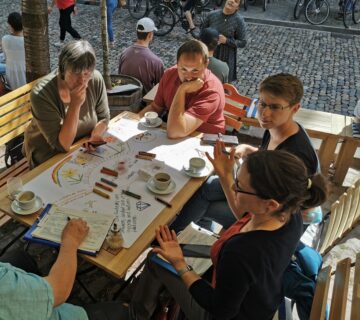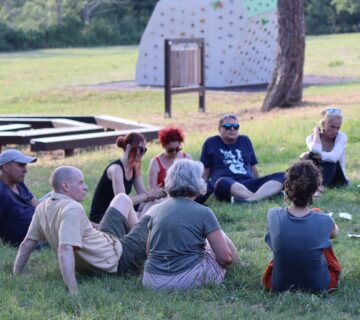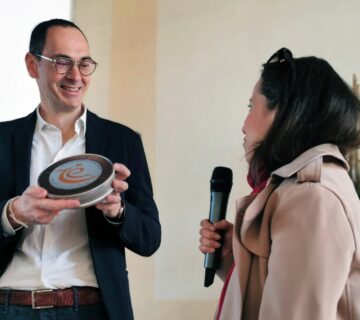Markus Blank, Sandy Colvine, Evarist March, Michal Medek, Steven Richards-Price and Katja Winter, the members of Interpret Europe’s training team, share their views on the team’s role and its plans for the future.
Markus, you are both a member of the training team and of IE’s Supervisory Committee. Taking this into account, how do you see the role of the training team within Interpret Europe?
Since we claim to be the organization for Heritage Interpretation in Europe, it is essential to offer professional and standardized trainings especially to our members and it is also a good way to attract more people to become members.
Steven, you are the most recent member of the team. Why did you join?
I was one of the trainers at the recent InHerit Project pilot training courses in Heritage Interpretation in London and Sabaudia, Italy (the only trainer to participate in both courses) where I got a real buzz from training our enthusiastic participants from all over Europe. The ‘interpretive writing’ part of the course in Sabaudia worked well and gave me the confidence that we could produce a training course that will work in our different languages – so I have created a job for myself! At the Mechelen conference I was asked whether I would like to join the team and I said ‘yes’, so here I am!
Katja, with three different jobs that take up most of your time, you already have plenty to do! So, why offering the few free hours you have to the training team?
To distribute the idea of heritage interpretation it’s crucial to connect all over Europe and to train people to spread the idea themselves. Furthermore, I find it a personal enrichment to be a part of this international training team – I like the ‘friendship-like atmosphere’ within.
As a team, we wish to organise training courses that will meet the needs of interpretive professionals from all over Europe. Sandy, do you consider this to be over-ambitious as a goal?
Not if we are realistic. We have to listen to people and not think that we have the answers to all their needs. We can glean facts and information to help us from the recent IE trends analysis and practical experience from pilot training exercises in the HeriQ and InHerit European projects. But as the training is essentially tried-and-tested practical exercises, we have seen these can be mastered by guides and other heritage professionals of different nationalities, so we can feel pretty confident that this can be achieved.
We’re at the start of a journey in a young and fast developing sector. It’s both exciting and challenging and experience up to now shows that there is a real thirst among heritage professionals to develop and fine-tune their interpretive skills.
Evarist, you are an IE Certified Trainer. In the last 2 years, you have already trained more than 45 Interpretive Guides in Spain. What is, in your opinion, the added value they gain from IE’s Guides course?
In general the participants – even the most experienced ones – like having to follow an easy structure of how to organise an interpretive talk, walk or of how to evaluate their work. At the same time, they assess the tools offered as very practical and very simple to understand. Finally, the participants appreciate how hands-on this course is, since more than 70% of it covers field exercises, practicing what they have learnt in theory.
Furthermore, in my courses, thanks to my professional experience as a nature guide, I include some practical demonstrations of what I’m explaining, so that they have clear references on how this method is applied..
In few weeks, the first International Guides and Guides Trainers course is going to be co-organised with SIMID and you, Michal, play a crucial role as our host at Kapraluv Mlyn. What do you expect that will come out of this experience?
Just the very fact the courses are taking place in the Czech Republic raises awareness about heritage interpretation. I feel high potential of the field in the new EU member states as vast sums are being spent on heritage interpretation projects, often without proper interpretive planning and adequate softskills development. We see that together with Interpret Europe there is a chance to change it.
To cite this article:
Stergioti, V. (2016) ‘A look within IE’s training team’. In Interpret Europe Newsletter 2-2016, 21
Available online:
https://www.interpret-europe.net/fileadmin/Documents/publications/Newsletters/ie-newsletter_2016-2_summer.pdf




